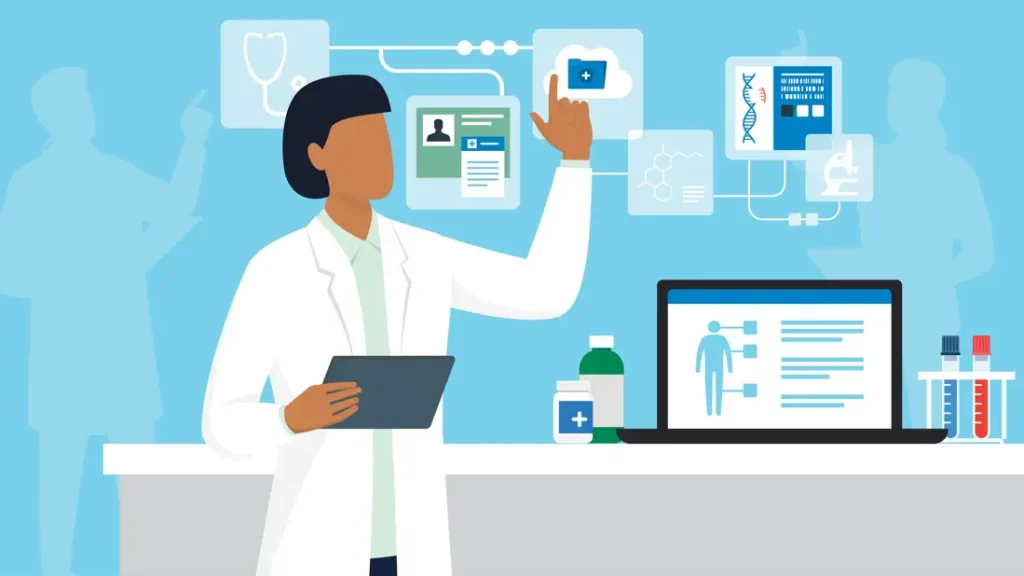How AI Saves Lives in Healthcare
Artificial Intelligence (AI) is transforming healthcare by saving lives and enhancing patient care. It offers precision, speed, and efficiency. With applications in early diagnosis, personalized medicine, predictive analytics, AI-assisted surgeries, and drug discovery, AI’s impact is immense. Here’s a detailed exploration of how AI is revolutionizing healthcare.
AI in Early Diagnosis
Early diagnosis improves survival rates for critical diseases like cancer, heart conditions, and diabetes. AI excels in this domain.
AI algorithms quickly analyze medical scans, identifying abnormalities with greater accuracy than human doctors. This ensures early detection.
For example, AI detects early-stage cancers by analyzing patterns in X-rays and MRIs, offering patients better chances of survival.
AI-powered tools also identify diseases before symptoms appear by analyzing data from wearable devices monitoring vital signs.
These tools enable doctors to intervene early, resulting in effective treatments and improved outcomes for patients.
Predictive Analytics for Proactive Care
Predictive analytics powered by AI prevents medical emergencies by forecasting risks using patient data.
AI examines historical and real-time data, predicting the likelihood of health issues like heart attacks and strokes.
For instance, AI tracks vital trends, such as blood pressure, alerting providers to potential problems before crises occur.
During the COVID-19 pandemic, AI analyzed global data to predict infection surges, helping allocate resources effectively.
This proactive approach enhances preparedness, reduces hospitalizations, and ultimately saves lives.
AI-Assisted Surgeries: Precision and Safety
AI-assisted surgical systems improve accuracy and safety during complex procedures. These systems minimize invasiveness and enhance precision.
Robotic tools guide surgeons by making precise movements, reducing the risk of human errors during operations.
AI-powered robots also assist in planning surgeries by analyzing imaging data to determine the most effective approach.
Patients benefit from shorter recovery periods, fewer complications, and improved surgical outcomes.
For example, robotic systems perform minimally invasive surgeries, excelling in procedures like tumor removal and joint replacements.
Accelerating Drug Discovery
During COVID-19, AI identified treatments quickly, helping save countless lives by speeding up therapeutic discoveries.
This efficiency ensures life-saving treatments reach patients sooner, addressing critical healthcare challenges.
Personalized Medicine: Individualized Treatment
AI enables personalized medicine by tailoring treatments to each patient’s unique genetic and health profile.
It analyzes genetic data to predict risks, helping doctors recommend preventive care or specific treatments.
In cancer treatment, AI identifies genetic markers in tumors, guiding the creation of targeted and effective therapy plans.
Patients experience fewer side effects and improved outcomes, as treatments address their individual needs precisely.
This approach reduces trial-and-error in treatments, enhancing healthcare efficiency and patient satisfaction.
Ethical Challenges and Practical Solutions
Despite its potential, AI in healthcare raises ethical and operational concerns. Addressing these is critical for its success.
1. Accountability:
When AI makes errors, determining responsibility among developers, healthcare providers, and the system is challenging.
Solution: Establish clear guidelines defining accountability for AI-based decisions to ensure ethical use in healthcare.
2. Data Privacy:
AI relies on patient data, raising concerns about misuse and security breaches.
Solution: Implement strict data privacy laws and robust security measures to protect sensitive information.
3. Bias in AI Models:
AI models trained on biased datasets may produce inequitable healthcare outcomes.
Solution: Regularly audit AI algorithms and use diverse datasets to reduce biases in decision-making.
The Future of AI in Healthcare
AI is reshaping healthcare with its precision, speed, and predictive capabilities. Its potential to save lives is undeniable.
From diagnosing diseases early to guiding surgeries and developing new treatments, AI continues to revolutionize the medical field.
With ethical implementation and responsible oversight, AI can create a proactive, patient-centered healthcare system.
The future of healthcare is bright, as AI enables longer, healthier lives for people worldwide.
Read our latest Blog
How Can AI Help Solve Climate Change ?

